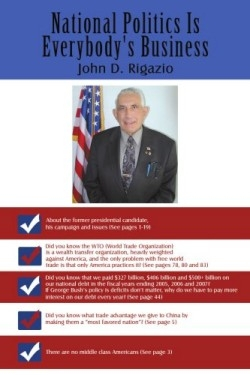National Politics is Everybody's Business
John D. Rigazio may be the most frustrated politician in the U.S. today for good reason. His bald statements make him look like a right-wing or maybe left-wing nut—but after qualifying these statements with five or six points he comes across as a thoughtful careful humanitarian who fits in no current category. What he really is the author writes is a “Nationalist.”
The son of Italian immigrants Rigazio is a successful businessman who wrote political columns for local papers for five years and ran for president in the New Hampshire primaries of 2004—first as a Democrat and then as a Republican.
More than anything else the author wants the U.S. to leave the World Trade Organization which he calls a “wealth transfer organization.” Our factories are closing because Asian “slave labor” makes most of the goods we buy. His solution: twenty to forty percent tariffs on imports from factories owned by multi-national corporations that support the WTO and make it possible for them “to buy as cheap as they can world-wide to sell as high as they can world-wide and to pay as little taxes as they can world-wide.” He showcases the power of the WTO in forcing the 2003 repeal of U.S. steel tariffs which had given American factories a chance to grow.
Both major political parties support the WTO arguing that it makes goods cheaper for Americans. It does but as the dollar falls wages remain stagnant or decline and jobs become harder to get fewer Americans can benefit from those low prices on imports.
Although he condemns the “socialization” of America which began he says with the Johnson administration Rigazio argues against any change in Social Security. He demands that we secure our borders but also make it possible for illegal immigrants who have kept jobs for a year to become citizens in six months. The health care system is broken so he advocates a three-tiered single-payer plan that assures medical attention for every citizen. His proposal would give privileges to the rich but would leave nobody out.
Rigazio passionately discusses most of the issues facing the country today including the economy the housing crisis the federal deficit and the invasion of Iraq. In every case lots of readers will disagree with him but his solutions are all worth considering.
This book deserves to be read despite its complete lack of organization. Any editor or writer who turns the pages will itch to put everything in an easy-to-read order. It’s a pity someone didn’t do it for him before he published.
Organized or not and whether his readers agree or not Rigazio is surely right about one thing—national politics is everybody’s business. Perhaps this book will make a few more people take that to heart.
Reviewed by
Carter Jefferson
Disclosure: This article is not an endorsement, but a review. The publisher of this book provided free copies of the book and paid a small fee to have their book reviewed by a professional reviewer. Foreword Reviews and Clarion Reviews make no guarantee that the publisher will receive a positive review. Foreword Magazine, Inc. is disclosing this in accordance with the Federal Trade Commission’s 16 CFR, Part 255.

